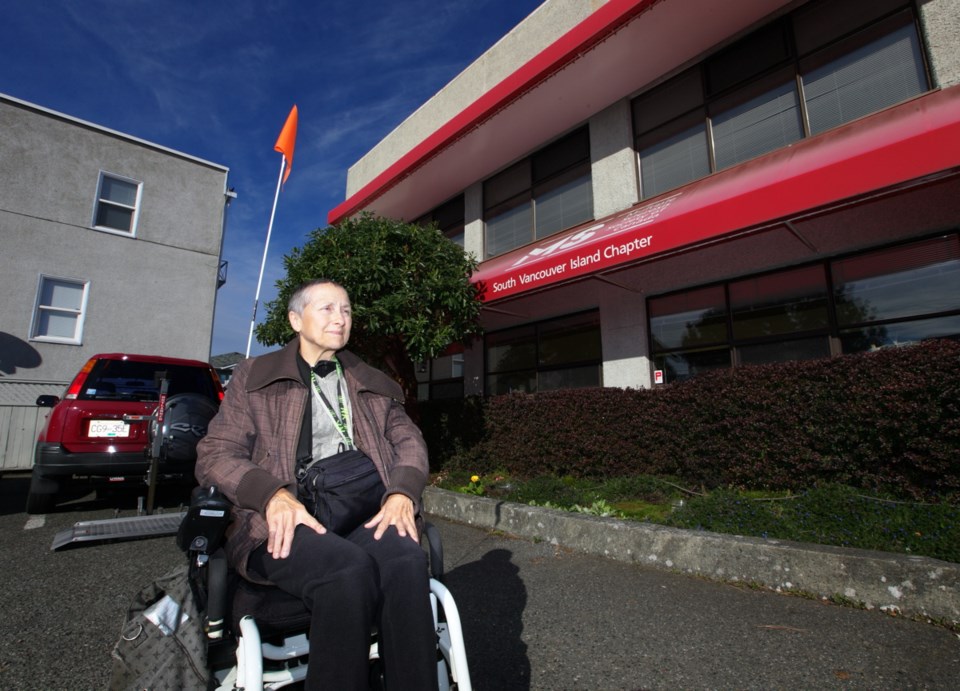Tearing up, River Grace said she wakes at night worrying what will happen when the MS Society building on North Park Street is sold and closed in December.
“It’s the only place I’ve found to get help to alleviate the worst pain known to mankind,” said Grace, 66, who has had multiple sclerosis for 45 years and uses the subsidized adaptive gym and physiotherapy program.
“I can’t do without it. I come every day,” she said in her motorized wheelchair outside the centre.
Canada has one of the highest rates of MS in the world. It is an autoimmune disease of the central nervous system and can cause extreme fatigue, pain and weakness to the point of immobility.
Grace is one of thousands of Victorians with MS who have used and supported the centre for years. At least 80 use the physiotherapy program regularly.
Many who are angry about the closure have formed a separate charity, and plan to hold rallies around the city to raise awareness and fund their own services.
“We have to do what we can. We can’t just let this go,” she said.
The 14,702-square-foot MS Society building at 1004 North Park St. is listed for sale for $3.1 million. It was originally owned by a local MS charity, which dissolved when the national MS Society of Canada acquired the building and its mortgage in 2001 to prevent it from being repossessed.
The centre is now set to close in December. Some of the services and programs will be relocated, but the gym and physio program will be gone, including two staff physiotherapists. It’s not yet known what will happen to the adaptive gym and mobility equipment donated to the centre.
“We do understand there’s a huge sense of loss. Change is often difficult,” said Tania Vrionis, president of the MS Society of Canada’s B.C. and Yukon division.
She said the decision to sell the building and close the gym and physio program was made by the national directors of the society. Several factors contributed, such as divesting assets across the country to focus on research, the high costs to keep the Victoria centre and programs running, and a mandate not to duplicate publicly funded health services.
“It is not the role of the MS Society to substitute for government in providing support for direct health services like medical care or therapeutic services. Therefore, the decision was made to discontinue physiotherapy services that are only offered in the Victoria location,” Vrionis said.
She said the society plans to rent another office space in the city and hopes it comes with a multi-purpose room for programs. No location has been secured yet.
“Programs and services will continue. We will have answers soon,” said Vrionis, adding her team is sifting through partnership proposals for services from businesses to community centres, and should be able to announce some programs by November.
“These may provide better options for some people,” said Vrionis. One man told her if services were available at the local community centre, his family could swim while he used the adaptive gym equipment or had physio.
But the users at the current MS Society centre said the whole point is having a place to call their own.
Craig Nernberg has used the centre for 21 years. Outside of it, he is isolated. He lives alone and uses a motorized wheelchair that operates by breath control.
“I met my best friends here,” Nernberg said while using an adapted exercise bike. “It keeps my circulation going and makes my body comfortable.”
Robin Grist uses the centre, gym and physio two or three times a week. She said it is a lifeline for her, and she feels betrayed by the sale and closure after raising funds for the society for years.
“It’s so important to many of us with MS to be with people and people who have this illness and live this life,” Grist said.
Susan Simmons is a local marathon swimmer and athlete helping to organize a new local MS group and wellness centre. They are hoping to raise funds and recruit volunteers through rallies, community meetings and the website saveourmscentre.ca.
“People want to help people in our community,” said Simmons, who has tried to meet with the MS Society to discuss concerns over the closure and feels disheartened by what she called a corporate culture at the national organization. “They won’t meet with us or talk to us. … They don’t even refer to us as people. We’re stakeholders.”
The MS Society of Canada was given a B- grade by the annual Moneysense ratings of the top 100 Canadian charities in 2016. According to the rating, for every dollar raised by the society, 50 cents goes to programs. The rest goes to fundraising and administrative costs. The charity employs 78 people full time. One person makes more than $350,000 per year. Nine staff salaries range from $120,000 to $250,000.



